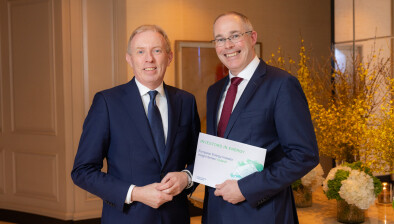High Court: Woman admitted into wardship as son failed to provide proper care

The High Court has admitted an 89-year-old woman into wardship after her son failed to properly care for her significant personal needs and took out €87,000 from her bank account without authority. The woman was suffering from an acquired brain injury and dementia, requiring 24-hour care.

About this case:
- Citation:[2022] IEHC 448
- Judgment:
- Court:High Court
- Judge:Ms Justice Niamh Hyland
Delivering judgment in the case, Ms Justice Niamh Hyland held that wardship was in the best interests of the woman. In so ruling, the court held that an unregistered Enduring Power of Attorney in favour of the son was not sufficient to meet the needs of the woman.
Background
The respondent was born in 1932 and was a widow. She had six children, one of whom was known as ET. The respondent had an accident with a bin lorry in 2017 where she sustained a fractured skull. Thereafter, her short-term memory became very poor.
ET moved to live with the respondent and provide care to her. However, the other children became concerned with the manner in which the woman was being cared for. It was stated that the respondent required 24-hour care due to her mental incapacity but that she was often left alone overnight by ET. It was also claimed that she was not properly cleaned and food was out of date. Generally, it was said that ET had taken total control of the respondent’s life and had prevented her from leaving the house or seeing her family for years.
It was also stated that ET had disconnected the doorbell and that neighbours had not seen the respondent for months. In January 2022, a HSE safeguarding team reported that the gates to the house were locked. The team found the respondent to be confused, unclean and in a very dirty house. Urgent capacity assessments were arranged but were cancelled by ET.
Additionally, the sum of €87,000 was taken out of the respondent’s bank account between February 2018 and May 2019 without explanation.
When the respondent was in hospital for the 2017 accident, it was agreed by the family to execute an EPA, with ET and another adult child named as attorneys. However, in October 2019, ET brought the respondent to execute an EPA with ET named as the sole attorney. The EPA was never registered and related only to the management of the respondent’s financial affairs.
In February 2022, an application was made by three of the respondent’s children to make her a ward of court under the Lunacy Regulation (Ireland) Act 1871. The court initially directed that a medical visitor should inquire into the respondent’s state of mind and capacity. However, ET made it difficult for this assessment to occur.
The respondent was eventually assessed by two doctors, who outlined that she had significant short-term memory difficulties, had an impaired comprehension and an inability to retain information. It was concluded that the respondent was likely suffering from dementia which would deteriorate over time.
ET opposed the wardship application, claiming that the 2019 EPA was sufficient to meet her needs. In his affidavit, he exhibited medical reports from September 2018 and January 2020 which noted that the respondent’s cognitive function had severely deteriorated.
ET argued that his mother did not want to go to a nursing home under any circumstances and that he sometimes needed to leave the house to go to the shops or visit his own daughter. Further, ET claimed that the respondent wanted him to take control of her financial affairs entirely and allowed him to take money as he required. ET also stated that he had prostate carcinoma which was operated on in May 2022.
In respect of the EPA, ET attempted registration in June 2022. However, the Wards of Court Office did not accept the registration because of the ongoing wardship application.
High Court
Ms Justice Hyland began her assessment by noting that the medical evidence was unambiguous. It was clear that the respondent lacked capacity and met the statutory test of being of unsound mind and unable to manage her affairs. As such, the court had to consider whether to exercise its discretion to bring the respondent into wardship.
The court held that the respondent’s financial affairs were not being managed properly, stating that ET accepted he was taking money from her account but had “not made any efforts to account for same or explain how the money is being used”. He provided no information regarding her financial affairs to the court.
Further, the court was satisfied that the respondent had not been properly cared for by ET. the court noted that there had been no attempt to obtain medical treatment for the respondent, that she had not been brought to her GP for routine check-ups and her pacemaker had not been attended to at all.
Additionally, the respondent had not seen her other five adult children for two years despite those children making strenuous efforts to remain in contact. The court also noted that serious medical condition of ET which showed he could not provide 24-hour care.
The court accepted that the EPA was a relevant consideration in the proceedings. For the purpose of the matter, the court treated the EPA as valid despite it not being registered. It was noted that the EPA was limited and only allowed ET to act in relation to the respondent’s property and financial affairs.
The court considered sections 10(6) and 12(4)(b) of the Powers of Attorney Act 1996 and held that the outstanding application for registration of the EPA did not preclude the court from making a wardship order. Having regard to the medical evidence and the urgency of the situation, the court held that it would not be appropriate to adjourn the wardship application to allow the registration of the EPA to occur.
inally, the court appointed the General Solicitor to act as the respondent’s committee in circumstances where the family were not agreed. The court was satisfied that ET should not be part of the respondent’s committee due to the “very serious deficits” in his mother’s care and her estate.
Conclusion
The respondent was admitted into warship and the General Solicitor was appointed as committee of the person and of the estate.
In the Matter of Ms AB [2022] IEHC 448










